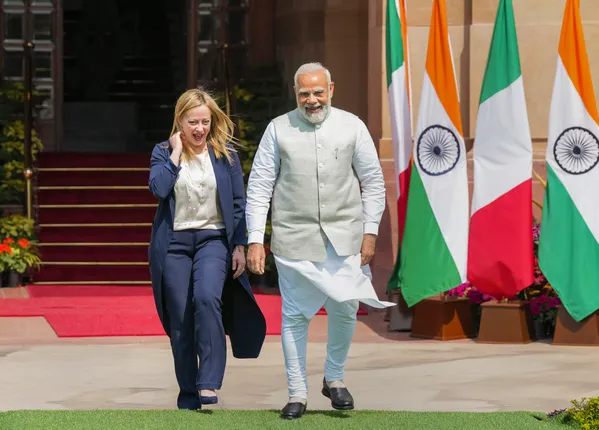Context:
Recently, Prime minister of India and his Italian counterpart unveiled the Italy-India joint strategic action for 2025-2029 at the G20 Summit in Rio de Janeiro, Brazil.
More on the news
- Political Dialogue: The two nations agreed to enhance political ties through regular high-level meetings, yearly bilateral consultations, and frequent ministerial interactions to foster cooperation in key sectors.
- Economic Cooperation: The countries aim to boost economic ties by enhancing trade, investments such as agricultural products and machinery, chemical-pharmaceuticals, wood and furniture, etc., and industrial partnerships in high-potential sectors, leveraging joint commissions, business forums, and mutual collaborations.
- Defense Cooperation: The nations aim to deepen defense ties through regular consultations, enhanced interoperability, maritime cooperation, technology collaboration, and a proposed Defense Industrial Roadmap and MoU between key industry bodies.
- Security Cooperation: Improve security cooperation with regular exchanges and capacity-building initiatives in specialized areas, such as cybersecurity and cybercrime.
- Cooperation in Migration, people-to-people contact, Cinema, Tourism and Culture.
- The countries seek to enhance connectivity through sustainable transport, maritime and land infrastructure collaboration, and finalizing a maritime cooperation agreement within the India Middle-East Economic Corridor (IMEC) framework.
India Middle-East Economic Corridor (IMEC)

- It is a proposed economic corridor that will connect India and Europe via the Middle East.
- It is expected to reduce the transit time between its eastern and western nodes by 40%, and costs by 30%, compared to transportation via the Suez Canal.
Significance of IMEC:
- The IMEC seeks to boost manufacturing, promote food security, and optimize supply chains.
- IMEC has the potential to improve India’s maritime security.
- The IMEC is expected to include undersea data cables, telecommunications networks, and digital payment ecosystems.
About G20
- G20 is a group of 20, comprising of 19 countries – Argentina, Australia, Brazil, Canada, China, France, Germany, India, Indonesia, Italy, Japan, the Republic of Korea, Mexico, Russia, Saudi Arabia, South Africa, Türkiye, United Kingdom and the United States – and two regional bodies: the European Union and the African Union.
- It is an informal grouping, formed in 1999 after multiple economic crises across the world.
- It does not have a permanent secretariat or staff like the United Nations.
- Instead, the G20 presidency rotates annually among its member, with the presiding country responsible for setting the agenda, organizing its activities, and hosting the summits.
- Agendas for this year:
- Eradication of Hunger- Brazil plans to establish a Global Alliance Against Hunger, utilizing social programs and funding mechanisms to tackle global food shortages and supplies.
- Trade ties – The UK Prime Minister is prioritizing stronger trade ties to boost the economy, addressing challenges from potential US tariffs under President-elect Trump and post-Brexit adjustments.
- Importance of G20:
- The member countries together account for 85% of global GDP, over 75% of the global trade, and about two-thirds of the world population.
- One of the key successes was managing the 2008 financial crisis through $4 trillion in stimulus, rejecting trade barriers, and implementing financial system reforms.
- The India-Middle East-Europe Economic Corridor, launched at the 2023 summit, that recently seen as a significant challenge to China’s Belt and Road Initiative.

